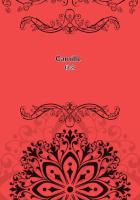HOPE SPRINGS ETERNAL IN THE HUMAN BREAST
March 20th.--Having now got rid of Mr. Huntingdon for a season, my spirits begin to revive. He left me early in February; and the moment he was gone, I breathed again, and felt my vital energy return; not with the hope of escape--he has taken care to leave me no visible chance of that--but with a determination to make the best of existing circumstances. Here was Arthur left to me at last; and rousing from my despondent apathy, I exerted all my powers to eradicate the weeds that had been fostered in his infant mind, and sow again the good seed they had rendered unproductive. Thank Heaven, it is not a barren or a stony soil; if weeds spring fast there, so do better plants. His apprehensions are more quick, his heart more overflowing with affection than ever his father's could have been; and it is no hopeless task to bend him to obedience and win him to love and know his own true friend, as long as there is no one to counteract my efforts.
I had much trouble at first in breaking him of those evil habits his father had taught him to acquire, but already that difficulty is nearly vanquished now: bad language seldom defiles his mouth, and I have succeeded in giving him an absolute disgust for all intoxicating liquors, which I hope not even his father or his father's friends will be able to overcome.
He was inordinately fond of them for so young a creature, and, remembering my unfortunate father as well as his, I dreaded the consequences of such a taste. But if I had stinted him in his usual quantity of wine or forbidden him to taste it altogether, that would only have increased his partiality for it, and made him regard it as a greater treat than ever. I therefore gave him quite as much as his father was accustomed to allow him--as much indeed, as he desired to have, but into every glass I surreptitiously introduced a small quantity of tartar-emetic--just enough to produce inevitable nausea and depression without positive sickness. Finding such disagreeable consequences invariably to result from this indulgence, he soon grew weary of it, but the more he shrank from the daily treat the more I pressed it upon him, till his reluctance was strengthened to perfect abhorrence. When he was thoroughly disgusted with every kind of wine, I allowed him, at his own request, to try brandy and water and then gin and water; for the little toper was familiar with them all, and I was determined that all should be equally hateful to him. This I have now effected; and since he declares that the taste, the smell, the sight of any one of them is sufficient to make him sick, I have given up teazing him about them, except now and then as objects of terror in cases of misbehaviour: `Arthur, if you're not a good boy I shall give you a glass of wine,' or `Now Arthur, if you say that again you shall have some brandy and water,' is as good as any other threat; and, once or twice, when he was sick, I have obliged the poor child to swallow a little wine and water without the tartar-emetic, by way of medicine; and this practice I intend to continue for some time to come; not that I think it of any real service in a physical sense, but because I am determined to enlist all the powers of association in my service:
I wish this aversion to be so deeply grounded in his nature that nothing in after life may be able to overcome it.
Thus, I flatter myself, I shall secure him from this one vice; and for the rest, if on his father's return I find reason to apprehend that my good lessons will be all destroyed--if Mr. Huntingdon commence again the game of teaching the child to hate and despise his mother and emulate his father's wickedness, I will yet deliver my son from his hands.
I have devised another scheme that might be resorted to in such a case, and if I could but obtain my brother's consent and assistance, I should not doubt of its success. The old Hall where he and I were born and where our mother died, is not now inhabited, nor yet quite sunk into decay, as I believe. Now if I could persuade him to have one or two rooms made habitable and to let them to me as a stranger, I might live there, with my child, under an assumed name, and still support myself by my favourite art. He should lend me the money to begin with, and I would pay him back, and live in lowly independence and strict seclusion, for the house stands in a lonely place, and the neighbourhood is thinly inhabited, and he himself should negotiate the sale of my pictures for me. I have arranged the whole plan in my head; and all I want, is to persuade Frederick to be of the same mind as myself. He is coming to see me soon, and then I will make the proposal to him, having first enlightened him upon my circumstances sufficiently to excuse the project.
Already, I believe, he knows much more of my situation than I have told him. I can tell this by the air of tender sadness pervading his letters; and by the fact of his so seldom mentioning my husband, and generally evincing a kind of covert bitterness when he does refer to him; as well as by the circumstances of his never coming to see me when Mr. Huntingdon is at home. But he has never openly expressed any disapprobation of him or sympathy for me; he has never asked any questions, or said anything to invite my confidence. Had he done so, I should probably have had but few concealments from him. Perhaps, he feels hurt at my reserve. He is a strange being--I wish we knew each other better. He used to spend a month at Staningley every year, before I was married; but, since our father's death, I have only seen him once, when he came for a few days while Mr. Huntingdon was away. He shall stay many days this time, and there shall be more candour and cordiality between us than ever there was before, since our early childhood: my heart clings to him more than ever; and my soul is sick of solitude.
April 16th.--He is come and gone. He would not stay above a fortnight.
The time passed quickly, but very, very happily, and it has done me good.















